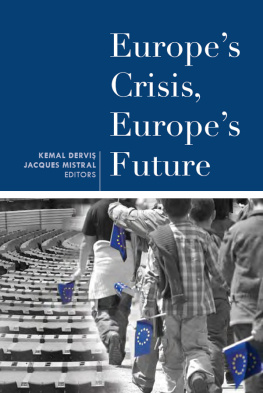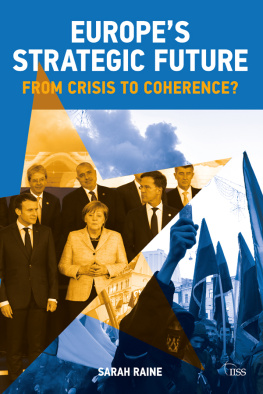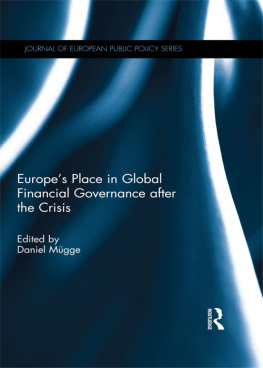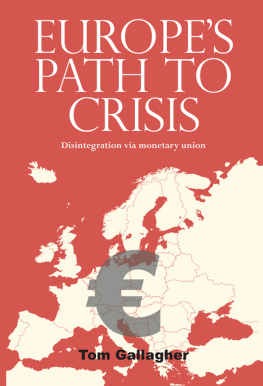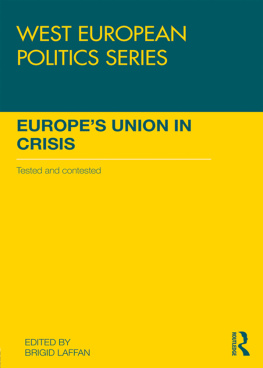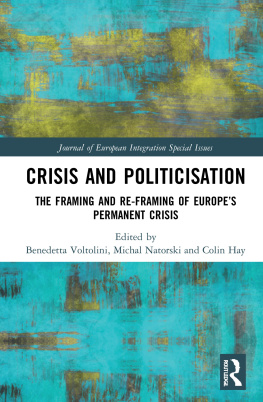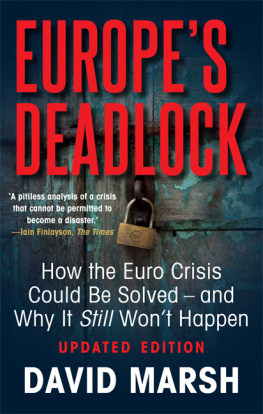Copyright 2014
THE BROOKINGS INSTITUTION
1775 Massachusetts Avenue, N.W., Washington, D.C. 20036
www.brookings.edu
All rights reserved. No part of this publication may be reproduced or transmitted in any form or by any means without permission in writing from the Brookings Institution Press.
The Brookings Institution is a private nonprofit organization devoted to research, education, and publication on important issues of domestic and foreign policy. Its principal purpose is to bring the highest quality independent research and analysis to bear on current and emerging policy problems. Interpretations or conclusions in Brookings publications should be understood to be solely those of the authors.
Library of Congress Cataloging-in-Publication data is available.
ISBN 978-0-8157-2554-1 (pbk. : alk. paper)
9 8 7 6 5 4 3 2 1
Printed on acid-free paper
Typeset in Adobe Garamond
Composition by Circle Graphics
Columbia, Maryland
Foreword
JAVIER SOLANA
There is strong hope that 2014 will be a year of renewed growth in the eurozone, even in the countries that were in deep crisis for several years. The resumption of growth would of course be good news but will not resolve the tremendous pressures generated by high unemployment and social difficulties that remain widespread, even beyond Southern Europe. The year 2014 will also see elections to the European Parliament, with the prospect that euro-skeptic parties will find new support. The election campaigns will likely include a more vigorous debate about the future of Europe, which should be viewed as a positive side effect.
This book draws on the experience of a diverse set of authors and on two key workshops, one held at ESADE in Madrid in March 2013, and the other at the Robert Bosch Stiftung in Berlin in May 2013. It links a discussion of individual country case studies to the broader debate over reform in the eurozone and in Europe, with two chapters focusing in particular on the financial sector and on social policies.
Experience has shown that while it is difficult for Europe to launch a grand institutional reform in one dramatic stroke, progress has often been made in response to a crisis or to an accumulation of problems. When one looks back at what has happened since the eurozone crisis erupted late in 2009, first in Greece and then in Ireland, it seems fair to say that a lot has been achieved. There is a European Stability Mechanism (ESM) now in place with substantial financial firepower, and a new treaty has been agreed on, the Fiscal Compact, committing eurozone member countries as well as some others to increased fiscal policy cooperation. The European Central Bank (ECB) is in the process of becoming the supervisor of the eurozone banking system; again, some non-eurozone members are also accepting ECB supervision, though they are not in the monetary union. Nobody would have predicted this amount of institutional progress in 2008; but then, of course, nobody had predicted the severity of the crisis that unfolded after 2009. These steps have all been incremental, and some of the most important advances, such as the new Fiscal Compact, have had to sidestep European Union law and be launched as intergovernmental agreements, mainly because of objections by the United Kingdom. Nonetheless, the reforms cover not only the eurozone, but in some cases the whole EU.
The achievements summarized above should not lead one to underestimate two big areas of challenge that remain. One is the gap between the needs of Europe in 2014 and the perception that large segments of the European population have about the EU and the eurozone. Clearly, politics is lagging behind the economics-driven institutional steps, and Europe faces the challenge of having to generate much more vigorous support among its citizens for the institutions it is creating and the degree of cooperation it wants to embark on. The second major challenge has to do with the institutional structure itself. The situation a few years ago was such that, by treaty, the euro became the currency of the EU, although the United Kingdom and Denmark were able to negotiate formal exemptions for themselves, and Sweden has managed to stay out of the eurozone, despite the absence of a formal exemption. Legally, nothing has changed, but there is an increasing need for clarity as to which institutions and mechanisms apply to the eurozone and which apply to the entire EU. There is an inherent tension between a vision of Europe that is essentially identical to the eurozone, and a vision of Europe with at least two concentric circles, where some countries would durably remain outside a more integrated eurozone while being full members of the EU.
The editors and the authors of this volume address these issues from different perspectives and backgrounds at a time when the debate on the future of Europe is reaching a new phase. Will the recovery from acute crisis lead to complacency and unwillingness to address the issues that the crisis brought to the fore? Or, will the lessons be learned and lead to decisive new steps, both in setting country policies and in renewing a European institutional design that can accommodate more advanced integration in some domains and by some countries, as well as greater flexibility for others?
There is unlikely to be a huge breakthrough in the form of a comprehensive new treaty. The message of this book, however, is that purely marginal and slow changes will not be enough to generate a new confidence in the European project and the prosperity that should come with it. Having worked closely with most of the contributors to this volume and supported its publication, I agree that 2014 and the near future should be a period of strong and open debate and citizen engagement, followed by some courageous decisions that would become the bedrock of Europe's future. The world needs a stronger Europe, and one is possible if we work toward it together.
. Formally, this is the Treaty on Stability, Coordination and Governance in the Economic and Monetary Union, signed on March 2, 2012. It is also referred to as TSCG or the Fiscal Stability Treaty.
Acknowledgments
The editors would like to gratefully acknowledge the Stavros Niarchos Foundation, the ESADE Business School, and the Robert Bosch Stiftung for supporting this collaborative research and providing a forum for all authors. We also thank the authors for their dedication and excellence in research, as well as their collaboration in finalizing the book. We would like to thank those who have provided invaluable comments in the editing process, including John Page, Charles Stewart, Guillermo Vuletin, and Brookings Press staff. Valuable comments on various parts of this volume were also received, often at roundtable meetings, from Bill Antholis, Josep Borrell, Sandra Breka, Matthew Browne, Jean Pisani-Ferry, Randall Henning, Fiona Hill, Jacob Kirkegaard, Donald Kohn, Reza Moghadam, Ernesto Talvi, Thomas Wright, Stelios Vasilakis, and Nicolas Veron. Our deep gratitude also goes to Javier Solana for his continued support and guidance. We also thank Soumya Chattopadhyay, Annick Ducher, Karim Foda, Edith Joachimpillai, and Galip Kemal Ozhan for their research support and management in putting together this work.
Brookings recognizes that the value it provides is in its absolute commitment to quality, independence, and impact. Activities supported by its donors reflect this commitment, and the analysis and recommendations here are not determined or influenced by any donation. Interpretations or conclusions in all Brookings publications should be understood to be solely those of the authors.

